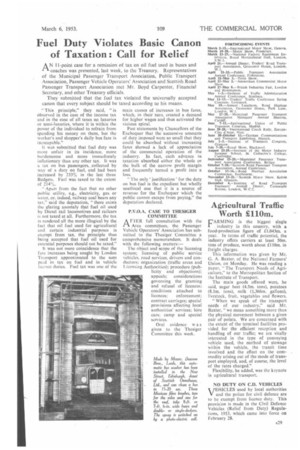Fuel Duty Violates Basic Canon of Taxation Call for Relief
Page 31

If you've noticed an error in this article please click here to report it so we can fix it.
A N 1I-point case for a remission of tax on oil fuel used in buses and "coaches was presented, last week, to the Treasury. Representatives of the Municipal Passenger Transport Association, Public Transport Association, Passenger Vehicle Operators' Association and Scottish Road Passenger Transport Association met Mr. Boyd Carpenter, Financial Secretary, and other Treasury officials.
They submitted that the fuel tax violated the universally accepted canon that every subject should he taxed according to his means.
" This principle," they said, "is observed in the case of the income lax and in the case of all taxes on luxuries or semi-luxuries, where it is within the power of the individual In refrain from spending his money on them, but the worker's and shopper's daily bus fare is inescapable."
It was submitted that fuel duty was more unfair in its incidence, more hurdensome and more immediately inflationary than any other tax. Ti was a tax on bus passengers, :collected by way of a duty on fuel, and had been increased by 233% in the last three Budgets. Fuel was taxed to the extent of 214%.
-" Apart from the fact that no other public utility, e.g., electricity, gas. or water, or, indeed, railway coal bears any lax," said the deputation, "there exists the glaring anomaly that fuel oil used by Diesel rail locomotives and railcars is not taxed at all. Furthermore, the tax is rendered all the more illogical by the fact that oil fuel used for agricultural and, certain industrial purposes is exempt from tax, the principle thus 'being accepted that fuel oil used for essential purposes should not be taxed."
It was not mere coincidence that the fare increases being sought by London Transport approximated to the sum paid in tax on fuel and in vehicle licence duties. Fuel tax was one of the main causes of increases in bus fares, which, in their turn, created a demand for higher wages and thus activated the vicious spiral.
Past statements by Chancellors of the Exchequer that the successive amounts of duty imposed were so small that they could be absorbed without increasing fares showed a lack of appreciation of the commercial operation of the industry. In fact, each advance in taxation absorbed either the whole or the bulk of the narrow profit margin and frequently turned a profit into a loss.
" The only ' justification ' for the duty on bus fuel is the expedient but wholly unethical one that it is a source of revenue for the Exchequer which the public cannot escape from paying," the deputation declared.
































































































